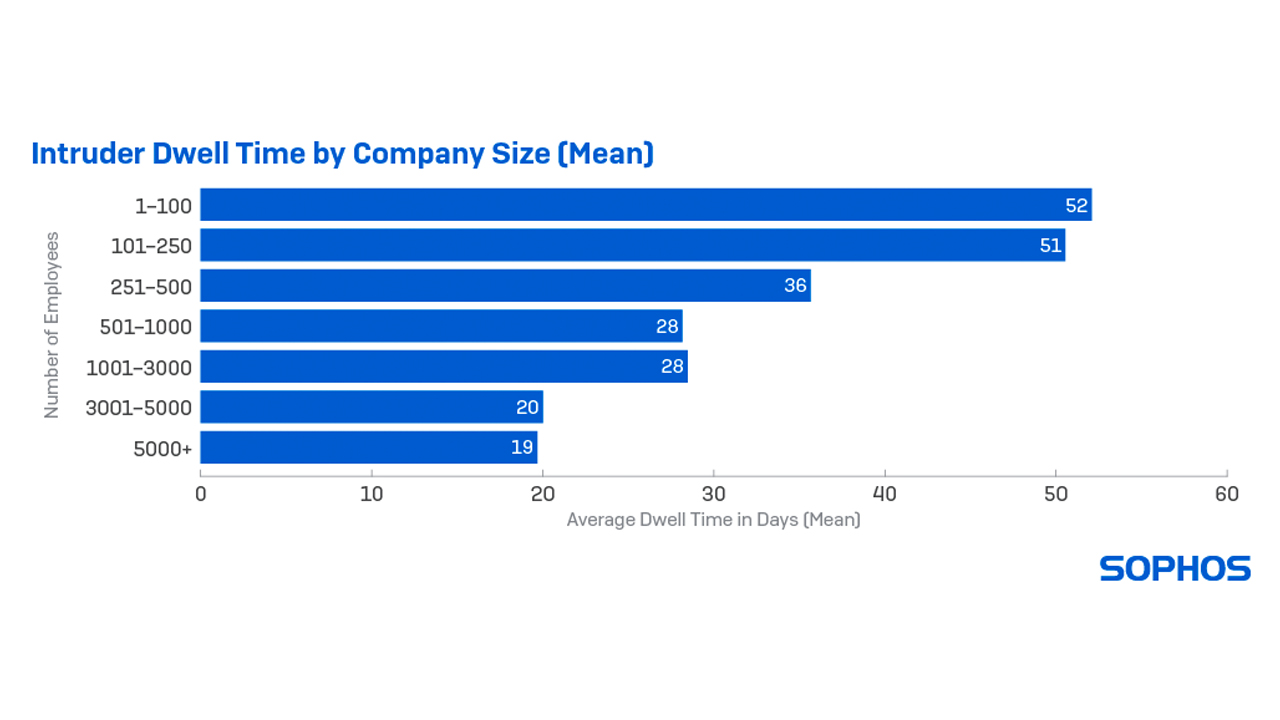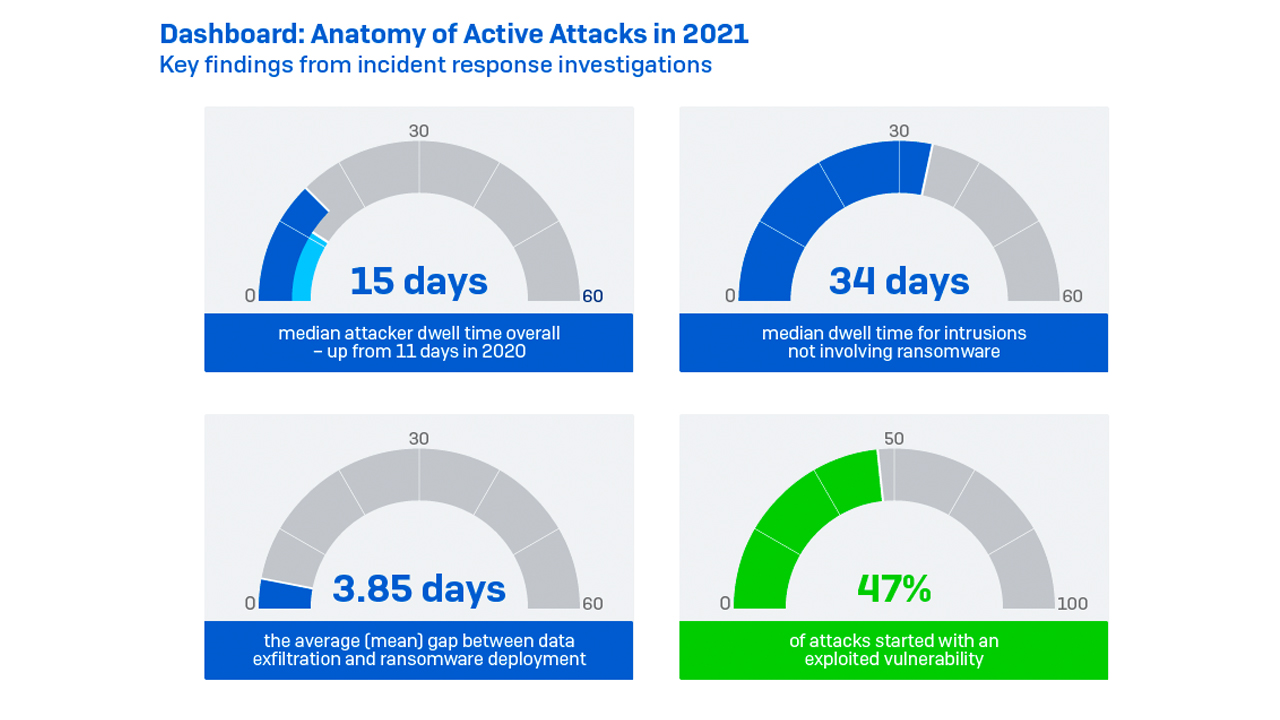Cyber criminals are spending longer inside business' networks after the initial breach
Cyber attackers' dwell time is up 36% thanks to initial access brokers and repeat exploitation of Microsoft Exchange vulnerabilities, according to Sophos


Cyber attackers are spending longer inside business systems after hacking them, a new report has revealed.
Rogue actors who do not use ransomware are spending the most time inside small businesses with the average dwell time observed to be 51 days in organisations with fewer than 250 employees. Attackers targeting larger (3,000 - 5,000 employees) organisations spend on average just 20 days inside.
The figures for ransomware criminals are much lower, with the average dwell time inside a business falling to just 15 days.
UK cyber security firm Sophos said these figures, taken from data in 2021, amount to a 36% increase in attacker dwell time compared to the previous year.

Longer dwell times could be indicative of the increasing popularity of initial access brokers (IABs) in the cyber security landscape, the company said.
IABs are online services that are often sold on the deep web selling remote access to companies to prospective hackers and charging them according to the time spent inside the system.
Longer dwell times not only allow attackers to launch more attacks but also open up victims to attacks from multiple threat actors, Sophos said.
Get the ITPro daily newsletter
Sign up today and you will receive a free copy of our Future Focus 2025 report - the leading guidance on AI, cybersecurity and other IT challenges as per 700+ senior executives
The company’s forensic analyses revealed instances of IABs, cryptominers, and multiple ransomware operators targeting businesses simultaneously.
Sophos said this growing trend of hackers simply paying for access rather than developing their exploits, for example, reflects the growing ‘professionalism’ of cyber attackers and is fuelling a thriving ransomware-as-a-service (RaaS) market.
RELATED RESOURCE

The Total Economic Impact™ of Mimecast
Cost savings and business benefits enabled by using Mimecast with Microsoft 365
FREE DOWNLOAD
“The world of cybercrime has become incredibly diverse and specialised. IABs have developed a cottage cybercrime industry by breaching a target, doing exploratory reconnaissance or installing a backdoor, and then selling the turn-key access to ransomware gangs for their own attacks,” said John Shier, senior security advisor at Sophos.
“In this increasingly dynamic, speciality-based cyberthreat landscape, it can be hard for organisations to keep up with the ever-changing tools and approaches attackers use. It is vital that defenders understand what to look for at every stage of the attack chain, so they can detect and neutralise attacks as fast as possible.”

In addition to the pervasive reliance on IABs, Sophos’ analysis of cyber attacks revealed that the second of the most influential threats was the continued exploitation of the ProxyLogon and ProxyShell vulnerabilities in Microsoft Exchange servers.
Microsoft said this week that it had to delay the development of the next version of Microsoft Exchange by four years due to assigning so many experts to improve the security of the mail and calendaring service in the wake of mass exploitation last year.
Sophos said the bugs led to a significant number of incidents it saw during 2021 and that there are likely to be many related breaches of which businesses are still unaware.
The implantation of web shells and backdoors is likely to go unnoticed and the access they provide may later be sold to willing bidders in the IAB market, it said.
Other wider findings in the company’s Active Adversary Playbook report revealed that data exfiltration was far more common in ransomware incidents than in previous years, with the average time taken for actors to pull data from victims dropping from 4.28 to 1.84 days.
The trend speaks to the growing trend in ransomware of double extortion - a method which sees the victim’s systems corrupted, as well as data stolen with the threat of data leakage if the ransom isn’t paid.

Connor Jones has been at the forefront of global cyber security news coverage for the past few years, breaking developments on major stories such as LockBit’s ransomware attack on Royal Mail International, and many others. He has also made sporadic appearances on the ITPro Podcast discussing topics from home desk setups all the way to hacking systems using prosthetic limbs. He has a master’s degree in Magazine Journalism from the University of Sheffield, and has previously written for the likes of Red Bull Esports and UNILAD tech during his career that started in 2015.
-
 Bigger salaries, more burnout: Is the CISO role in crisis?
Bigger salaries, more burnout: Is the CISO role in crisis?In-depth CISOs are more stressed than ever before – but why is this and what can be done?
By Kate O'Flaherty Published
-
 Cheap cyber crime kits can be bought on the dark web for less than $25
Cheap cyber crime kits can be bought on the dark web for less than $25News Research from NordVPN shows phishing kits are now widely available on the dark web and via messaging apps like Telegram, and are often selling for less than $25.
By Emma Woollacott Published
-
 ‘Phishing kits are a force multiplier': Cheap cyber crime kits can be bought on the dark web for less than $25 – and experts warn it’s lowering the barrier of entry for amateur hackers
‘Phishing kits are a force multiplier': Cheap cyber crime kits can be bought on the dark web for less than $25 – and experts warn it’s lowering the barrier of entry for amateur hackersNews Research from NordVPN shows phishing kits are now widely available on the dark web and via messaging apps like Telegram, and are often selling for less than $25.
By Emma Woollacott Published
-
 Healthcare systems are rife with exploits — and ransomware gangs have noticed
Healthcare systems are rife with exploits — and ransomware gangs have noticedNews Nearly nine-in-ten healthcare organizations have medical devices that are vulnerable to exploits, and ransomware groups are taking notice.
By Nicole Kobie Published
-
 Alleged LockBit developer extradited to the US
Alleged LockBit developer extradited to the USNews A Russian-Israeli man has been extradited to the US amid accusations of being a key LockBit ransomware developer.
By Emma Woollacott Published
-
 February was the worst month on record for ransomware attacks – and one threat group had a field day
February was the worst month on record for ransomware attacks – and one threat group had a field dayNews February 2025 was the worst month on record for the number of ransomware attacks, according to new research from Bitdefender.
By Emma Woollacott Published
-
 CISA issues warning over Medusa ransomware after 300 victims from critical sectors impacted
CISA issues warning over Medusa ransomware after 300 victims from critical sectors impactedNews The Medusa ransomware as a Service operation compromised twice as many organizations at the start of 2025 compared to 2024
By Solomon Klappholz Published
-
 Warning issued over prolific 'Ghost' ransomware group
Warning issued over prolific 'Ghost' ransomware groupNews The Ghost ransomware group is known to act fast and exploit vulnerabilities in public-facing appliances
By Solomon Klappholz Published
-
 The Zservers takedown is another big win for law enforcement
The Zservers takedown is another big win for law enforcementNews LockBit has been dealt another blow by law enforcement after Dutch police took 127 of its servers offline
By Solomon Klappholz Published
-
 There’s a new ransomware player on the scene: the ‘BlackLock’ group has become one of the most prolific operators in the cyber crime industry – and researchers warn it’s only going to get worse for potential victims
There’s a new ransomware player on the scene: the ‘BlackLock’ group has become one of the most prolific operators in the cyber crime industry – and researchers warn it’s only going to get worse for potential victimsNews Security experts have warned the BlackLock group could become the most active ransomware operator in 2025
By Solomon Klappholz Published